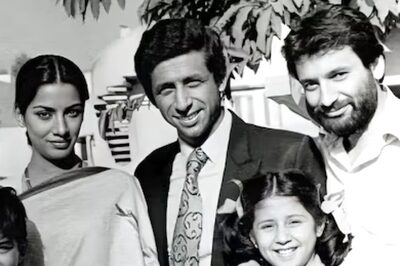
views
Bellur Narayanaswamy Srikrishna, Retired judge of the Supreme Court spoke to CNN-News18's Smitha Nair on recent controversy surrounding theatre activist Kamal Chavara who was charged with sedition in Kerala for allegedly insulting our national anthem over a Facebook post.
Excerpts:
News18: On Sunday writer and theatre activist Kamal Chavara was arrested and charged with sedition in Kerala. The complainant, a BJP worker, claimed the writer had insulted the national anthem in a facebook post ( an extract from his novel) How do you view this development?
Justice Srikrishna: The two offences are totally distinct. Assuming there was insult to the national anthem that may become punishable under some other provision of law but it cannot be called sedition.
News18: This arrest in Kerala came close on the heels of over 10 delegates of the international film festival of Kerala being booked for not standing up while the national anthem was not played. Is that not excessive?
Justice Srikrishna: Of course it is. In a country like USA it has been held that burning the national flag is the fundamental right of a citizen. Even in U.K. They were selling lingerie printed with the national flag at the time of the 75th anniversary of the Queen's ascension to the throne.
News18: How do you view the recent Supreme Court judgement making it mandatory for cinema halls to play the national anthem before the start of a screening?
Justice Srikrishna: I think the SC should steer clear of such issues and leave it to the executive to implement the laws already in existence. Nothing but judicial overkill in my view.
News18: Does the mandatory playing of the national anthem in your opinion help inculcate patriotism?
Justice Srikrishna: No. Respect must be commanded and not demanded or enforced. Enforcement of such sentiments will be counterproductive.
News18: what is sedition. How has the understanding of what constitutes sedition changed over time ? How did speaking ones mind or not standing up while the national anthem played become seditious?
Justice Srikrishna: The offence as defined consists of doing something by words or acts to promote disaffection towards the govt established by law. When it's constitutionality was challenged, the SC has read down the provision and held that there must be an additional element of incitement to breach of law and order in order to amount to offence of sedition.
News18: Increasingly in public discourse do you see the government of the day being equated with the nation. As in criticism of certain policies of the govt is viewed as or equated with being anti national.
Justice Srikrishna: Absolutely! The two are as different as chalk and cheese. One might hate the government and publicly show it but may yet be a nationalist. Much of the confusion has arisen because of the attempt to conflate the two concepts.




















Comments
0 comment